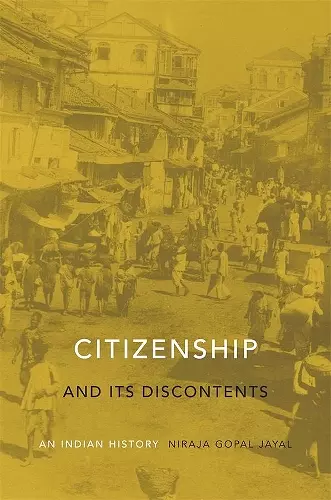Citizenship and Its Discontents
An Indian History
Format:Hardback
Publisher:Harvard University Press
Published:17th Mar '13
Currently unavailable, and unfortunately no date known when it will be back

A contribution to our understanding of citizenship and democracy in India that is empirically rich and theoretically sophisticated. -- Amrita Basu, Amherst College The idea of citizenship in India promised inclusive community, but the country's enlivened politics have transformed that promise into a more fragmentary, divisive reality. In this magisterial analytic history, Niraja Gopal Jayal maps for the first time the concept's vicissitudes, and makes an essential contribution to our understanding of contemporary India and of political theory. -- Sunil Khilnani, King's India Institute
The idea of citizenship in India has evolved from legal status to rights to identity over the past century. Early optimism for a true republic of equals is challenged today. Once seen as an anomaly, India is where every major theoretical debate about citizenship is being enacted, and a place no global discussion of citizenship can afford to ignore.
Breaking new ground in scholarship, Niraja Jayal writes the first history of citizenship in the largest democracy in the world—India. Unlike the mature democracies of the west, India began as a true republic of equals with a complex architecture of citizenship rights that was sensitive to the many hierarchies of Indian society. In this provocative biography of the defining aspiration of modern India, Jayal shows how the progressive civic ideals embodied in the constitution have been challenged by exclusions based on social and economic inequality, and sometimes also, paradoxically, undermined by its own policies of inclusion.
Citizenship and Its Discontents explores a century of contestations over citizenship from the colonial period to the present, analyzing evolving conceptions of citizenship as legal status, as rights, and as identity. The early optimism that a new India could be fashioned out of an unequal and diverse society led to a formally inclusive legal membership, an impulse to social and economic rights, and group-differentiated citizenship. Today, these policies to create a civic community of equals are losing support in a climate of social intolerance and weak solidarity. Once seen by Western political scientists as an anomaly, India today is a site where every major theoretical debate about citizenship is being enacted in practice, and one that no global discussion of the subject can afford to ignore.
Jayal argues that India’s history as a society built on the exclusionary logics of castes and tribes continues to clash with its self-image as an inclusive democracy. -- Andrew J. Nathan * Foreign Affairs *
Jayal effectively constructs an astonishingly comprehensive and complex history of the formations and transformations of citizenship in India. Citizenship and Its Discontents serves simultaneously as a rigorous introduction, a wide-ranging review, and a provocation in contemporary debates on citizenship in India and in a comparative frame—a rare and difficult achievement. -- Radhika Mongia * The Book Review *
Citizenship and Its Discontents discusses the implications of citizenship through a survey of Indian history… This is an extremely interesting and pertinent subject, with implications for Western societies such as the United States and Europe. It is a fascinating history, well-researched and thoughtful. -- Gretchen Wagner * San Francisco Book Review *
Jayal provides a broad, historically grounded discussion of contestations over democracy and citizenship in India from the late colonial period to the present. Specifically, the author lucidly analyzes the evolving conceptions of citizenship as legal status, as rights, and as identity. She persuasively illustrates how the early optimism that a new India could be fashioned out of a deeply hierarchical and unequal society led to a formally inclusive legal membership and group-differentiated citizenship. Unfortunately, in recent years these progressive civic ideals embodied in the constitution have been fast losing support in a climate of growing intolerance, widening economic inequality, and weak and fragmented civic solidarity. This provocative book makes an important contribution to the understanding of one of the core challenges facing contemporary India, including a theoretically rich and informed discussion on issues pertaining to democracy, citizenship, and governance in the world’s largest democracy. -- S. D. Sharma * Choice *
A contribution to our understanding of citizenship and democracy in India that is empirically rich and theoretically sophisticated. -- Amrita Basu, Amherst College
The idea of citizenship in India promised inclusive community, but the country’s enlivened politics have transformed that promise into a more fragmentary, divisive reality. In this magisterial analytic history, Niraja Gopal Jayal maps for the first time the concept’s vicissitudes, and makes an essential contribution to our understanding of contemporary India and of political theory. -- Sunil Khilnani, King’s India Institute
- Winner of Ananda Kentish Coomaraswamy Book Prize 2015
- Nominated for Bernard Schwartz Book Award 2014
ISBN: 9780674066847
Dimensions: 235mm x 156mm x 30mm
Weight: 703g
376 pages